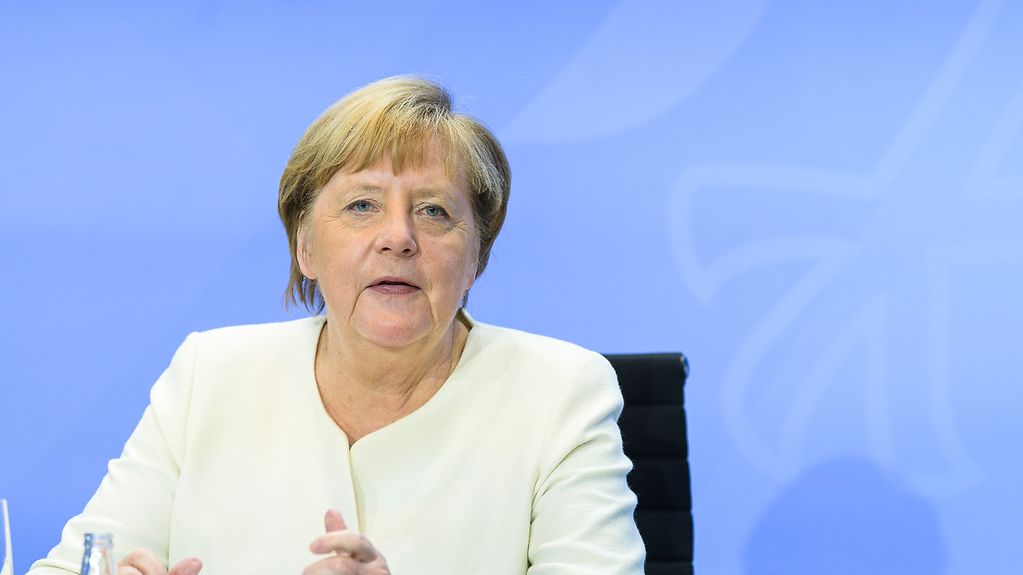Resolutions of federal and state governments
Federal and state governments intend to take swift, regionally appropriate action in order to keep the number of new COVID-19 infections down. "But we know that difficult times lie ahead as we move into the autumn and winter months," underscored Chancellor Angela Merkel after a video conference with the state premiers of the sixteen federal states.
3 min reading time

Our goal is to uphold as much as possible of public and private life, stressed Chancellor Angela Merkel.
Photo: Bundesregierung/Denzel
Rising numbers of new cases are giving grounds for concern, but we know that we can counter this trend by taking the right measures, said Angela Merkel. That is why the meeting today considered what messages to send to people in Germany. "We all know that we can only enforce measures if the people are willing to follow the rules and do their bit to prevent the further spread of the pandemic."
There was clear agreement that "We have priorities: we want to keep the economy going, and we want children to be able to go to school and nursery as far as possible."
AHA + C + L – the German formula for success
Federal and state governments are calling on everybody in Germany to continue to rigorously respect distancing and hygiene measures, and to help contact tracing by providing the correct contact data.
The general "AHA" formula, the German acronym for distancing, hygiene measures, and face coverings, is to be joined by two more recommendations as temperatures drop and numbers of new cases rise: "C" which stands for "Use the Corona-Warn-App" and "L" which stands for "air rooms".
People are often dismissive about airing rooms, but it might be one of the cheapest and most effective ways of containing the spread of the pandemic, explained the Chancellor.
In addition to mandatory face masks, the recording of contact data in places like restaurants is to be monitored in future. If anyone leaves false information, they will in future face a minimum fine of 50 euros. Restaurants are called on to run plausibility checks, to ensure that their contact lists are complete and correct.
Continuing the testing strategy
The German government will be continuing its testing strategy. In particular, it is to be ascertained to what extent appropriate rapid tests can be used. The new quarantine regulations for travellers arriving in Germany are to be put into practice as swiftly as possible.
To prevent the health system becoming overstretched over the winter months, out-patient clinics for patients with fever, dedicated consulting hours and dedicated medical practices are to be used. Parallel to this, high-risk groups in particular should be vaccinated against influenza to prevent any potentially highly dangerous double infection.
Hot spot strategy to be further developed
Federal and state governments agree that immediate clamp-downs at local level are needed to address any regional rise in numbers of new cases. The federal states are to ensure that in districts or towns where a cumulative seven-day total of over 50 new cases per 100,000 inhabitants is reached, immediate restrictions are imposed with the involvement of the relevant state authorities.
Everyone is called on to weigh up critically in every individual instance, whether, how and to what extent private parties are necessary and can be justified, given the rising infections.
The states will introduce regulations that impose a ceiling on the number of guests at private celebrations, as soon as the cumulative seven-day total of over 35 new cases per 100,000 inhabitants is reached. A maximum of 50 participants are to be permitted at celebrations in public or rented premises. It is urgently recommended that no more than 25 people meet in private homes.
When the cumulative seven-day total of over 50 new cases per 100,000 inhabitants is reached in a district, additional measures are to be taken. In particular the maximum number of people attending celebrations in public or rented premises will drop to 25. It is then urgently recommended that no more than 10 people come together in private homes.
Taking a regionally balanced approach
In addition, the states are to put in place a suitable early warning system before the 50 new case limit is reached, so as to avoid exceeding this incidence if at all possible.
"Our goal is to uphold as much as possible of public and private life," stressed Angela Merkel. And that means taking swift action when high infection rates occur, but always adopting a regionally balanced approach. "That is what we have learned. We do not always need to do the same for everyone; we must be able to take regionally balanced action – and I think that is a positive message."